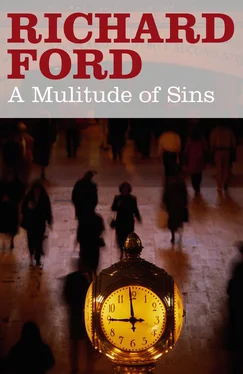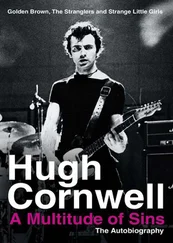“Don’t go fallin’ in, baby,” Renard said to my father from the rear of the boat as he was giving the motor cord a strong pull. He had a deep, mellow voice, tinged with sarcasm. “I don’t think nobody’ll pull ya’ll out.”
My father, I think, didn’t hear him. But I heard him. And I thought he was certainly right.
I cannot tell you how we went in Renard Junior’s boat that morning, only that it was out into the dark marshy terrain that is the Grand Lake and is in Plaquemines Parish and seems the very end of the earth. Later, when the sun rose and the mist was extinguished, what I saw was a great surface of gray-brown water broken by low, yellow-grass islands where it smelled like tar and vegetation decomposing, and where the mud was blue-black and adhesive and rank-smelling. Though on the horizon, illuminated by the morning light, were the visible buildings of the city — the Hibernia Bank where my father’s office had been — nudged just above the earth’s curve. It was strange to feel so outside of civilization, and yet to see it so clearly.
Of course at the beginning it was dark. Renard Junior, being small, could stand up in the rear of the skimming boat, and shine his own light over me in the middle and my father hunched in the boat’s bow. My father’s blond hair shone brightly and stayed back off his face in the breeze. We went for a ways down the bayou, then turned and went slowly under a wooden bridge and then out along a wide canal bordered by swamp hummocks where white herons were roosting and the first ducks of those we hoped to shoot went swimming away from the boat out of the light, suddenly springing up into the shadows and disappearing. My father pointed at these startled ducks, made a gun out of his fingers and jerked one-two-three silent shots as the skiff hurtled along through the marsh.
Naturally, I was thrilled to be there — even in my hated military school clothes, with my drunk father dressed in his tuxedo and the little monkey that Renard was, operating our boat. I believed, though, that this had to be some version of what the real thing felt like — hunting ducks with your father and a guide — and that anytime you went, even under the most perfect circumstances, there would always be something imperfect that would leave you feeling not exactly good. The trick was to get used to that feeling, or risk missing what little happiness there really was.
At a certain point when we were buzzing along the dark slick surface of the lake, Renard Junior abruptly backed off on the motor, cut his beam light, turned the motor hard left, and let the wake carry us straight into an island of marsh grass I hadn’t made out. Though I immediately saw it wasn’t simply an island but was also a grass-fronted blind built of wood palings driven into the mud, with peach crates lined up inside where hunters would sit and not be seen by flying ducks. As the boat nosed into the grass bank, Renard, now in a pair of hip waders, was out heeling us farther up onto the solider mud. “It’s duck heaven out here,” my father said, then densely coughed, his young man’s smooth face becoming stymied by a gasp, so that he had to shake his head and turn away.
“He means it’s the place where ducks go to heaven,” Renard said. It was the first thing he’d said to me, and I noticed now how much his voice didn’t sound much like the yat voices I’d heard and that supposedly sound like citizens of New York or Boston — cities of the North. Renard’s voice was cultivated and mellow and inflected, I thought, like some uptown funeral director’s, or a florist. It seemed to be a voice better suited to a different body than the muscular, gnarly little man up to his thighs just then in filmy, strong-smelling water, and wearing a long wavy white-trash hairstyle.
“When do the ducks come?” I said, only to have something to say back to him. My father was recovering himself, spitting in the water and taking another drink off his bottle.
Renard laughed a little private laugh he must’ve thought my father would hear. “When they ready to come. Just like you and me,” he said, then began dragging out the big canvas decoy sacks and seemed to quit noticing me entirely.
. .
Renard had a wooden pirogue hidden back in the thick grass, and when he had covered our skiff with a blanket made of straw mats, he used the pirogue to set out decoys as the sky lightened, though where we were was still dark. My father and I sat side by side on the peach boxes and watched him tossing out the weighted duck bodies to make two groups in front of our blind with a space of open water in between. I could begin to see now that what I’d imagined the marsh to look like was different from how it was. For one thing, the expanse of water around us was smaller than I had thought. Other grass islands gradually came into view a quarter mile off, and a line of green trees appeared in the distance, closer than I’d expected. I heard a siren, and then music that must’ve come from a car at the Reggio dock, and eventually there was the sun, a white disk burning behind the mist, and from a part of the marsh opposite from where I expected it. In truth, though, all of these things — these confusing and disorienting and reversing features of where I was — seemed good, since they made me feel placed, so that in time I forgot the ways I was feeling about the day and about life and about my future, none of which had seemed so good.
Inside the blind, which was only ten feet long and four feet wide and had spent shells and candy wrappers and cigarette butts on the planks, my father displayed the pint bottle of whiskey, which was three-quarters empty. He sat for a time, once we were arranged on our crates, and said nothing to me or to Renard when he had finished distributing the decoys and had climbed into the blind to await the ducks. Something seemed to have come over my father, a great fatigue or ill feeling or a preoccupying thought that removed him from the moment and from what we were supposed to be doing there. Renard unsheathed the guns from their cases. Mine was the old A. H. Fox twenty-gauge double gun, that was heavy as lead and that I had seen in my grandmother’s house many times and had handled enough to know the particulars of without ever shooting it. My grandmother had called it her “ladies gun,” and she had shot it when she was young and had gone hunting with my father’s father. Renard gave me six cartridges, and I loaded the chambers and kept the gun muzzle pointed up from between my knees as we watched the silver sky and waited for the ducks to try our decoys.
My father did not load up, but sat slumped against the wooden laths, with his shotgun leaned on the matted front of the blind. After a while of sitting and watching the sky and seeing only a pair of ducks operating far out of range, we heard the other hunters on the marsh begin to take their shots, sometimes several at a terrible burst. I could then see that two other blinds were across the pond we were set down on — three hundred yards from us, but visible when my eyes adjusted to the light and the distinguishing irregularities of the horizon. A single duck I’d watched fly across the sky, at first flared when the other hunters shot, but then abruptly collapsed and fell straight down, and I heard a dog bark and a man’s voice, high-pitched and laughing through the soft air. “Hoo, hoo, hoo, lawd oooh lawdy,” the man’s voice said very distinctly in spite of the distance. “Dat mutha-scootcha was all the way to Terre Bonne Parish when I popped him.” Another man laughed. It all seemed very close to us, even though we hadn’t shot and were merely scanning the milky skies.
“Coon-ass bastards,” my father said. “Jumpin’ the shooting time. They have to do that. It’s genetic.” He seemed to be addressing no one, just sitting leaned against the blind’s sides, waiting.
Читать дальше












